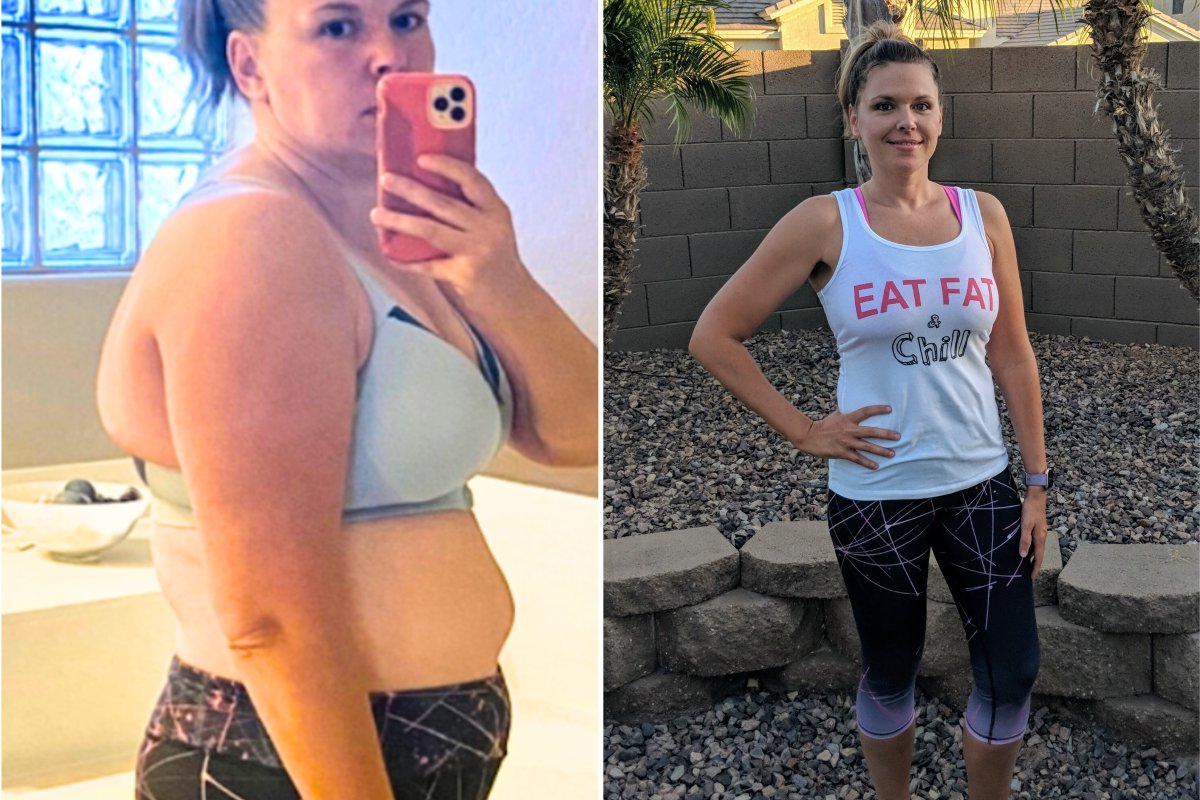In 2013, after the birth of my first child, I weighed 245 pounds. Even though I'd been a yo-yo dieter losing the same 20-40 pounds since age 12, this time I had more than 100 pounds to lose.
After experiencing gestational diabetes, I knew I had to get to a healthy weight so I did not progress to type two diabetes post-pregnancy.
After 25 years, I finally learned how to lose weight and keep it off for good by ditching fad diets. This time, I instead improved my digestion while basing my diet on real food.
I reached my original weight loss goal of losing 100 pounds a year after my second pregnancy in April 2017. I followed five daily habits to lose those 100 pounds.

1. Begin Every Day With a Healthy Start
The first habit was that I began every day by doing something healthy, like walking or doing resistance training.
My body was already trained to wake up bright and early after having kids. So once the children were old enough to have more independence in the morning, I took advantage of those early hours of being the first person awake and did my workout right away. That way, there were no excuses later in the day if I became tired or got too busy.
Back when I began this habit, getting a workout in meant I jumped on the elliptical first thing in the morning. But these days, depending on my schedule, I either start the day with a walk or get resistance training done.
According to Dr. Andrew Huberman, forming habits that are difficult to stick with is best accomplished within the first eight hours of waking. Of course, if you're not able to walk or work out first thing in the morning, I suggest you figure out another healthy morning habit.
2. Center Meals Around Protein
The second habit I changed to lose 100 pounds is that I centered every meal around protein. Making a breakfast that's high in protein is important if you want to lose weight and keep it off. Making protein the base of every meal is just as important.
Protein is the most filling macronutrient, which means the more protein you eat, the fewer overall calories you'll consume during the day; eating less than what you burn is an important factor in weight loss.
Protein is also important because getting enough helps you keep and build lean muscle. The more lean muscle you have, the higher your metabolism is.
It's especially important to skip the donuts, bagels, and cereals at breakfast and instead start the day with a meal that's high in protein.
When you start with a carb-heavy meal, it can set you up for uncontrollable blood sugar swings all day long. These swings will lead to cravings and hunger that make sticking to a calorie deficit nearly impossible.
If you're the type of person who cuts yourself some slack on the weekends or maybe even holidays, if you want to set yourself up for more success, then quit that mindset right now.
At a very minimum, you still want to focus on having a protein-heavy breakfast. If you have a little room at the end of your meal for a pancake or a pastry, try having a few bites instead of the whole thing and see if that's enough to settle your cravings.
3. Ditch Processed Junk Foods
The third habit I changed was that I swapped out heavily processed junk foods for real foods. While this may seem obvious, I don't think everyone understands the difference between whole, real foods and processed junk foods.
Processed foods are pretty much anything that comes in a box or a package. And yes, this does include treats that state "keto friendly" or "low calorie" on the package. Even though food manufacturers design their packages to make these foods seem like they fit into your plan, heavily processed foods are also engineered to have you eat more.
Studies show that those who include too many highly processed foods in their diet eat more calories per day than those who focus mostly on whole foods.
I'm not saying that you can't eat any processed foods if you want to lose weight, because you can, and I actually do. But I found the most success when I eat somewhere around 80 percent to 90 percent of my diet from whole foods—things like meat, vegetables, fruit, eggs, and cheese.
These days, if I want more of a processed treat—something like dark chocolate or chips and salsa—I usually wait until the end of the day. This is because I've already nurtured my body with a lot of nutritious foods by then, so it's less likely that any treat that I do have is going to spike my hunger or result in some kind of food binge.
I also carefully fit these foods into my macros so that I don't end up overeating. If I don't have any calories left over by the end of the day or my protein is just too low, my treat is going to have to wait until tomorrow night.
4. Track Every Meal
The fourth habit I changed was that I tracked every meal. I have been tracking my meals for a long time, but I was never as consistent as I should have been in order to get long-term results.
Previously, I started the day strong by tracking my breakfast, but by lunch or maybe by dinner, I'd find myself winging meals and guessing the calories.
While that can be a great strategy for weight maintenance, if you still have a lot of weight to lose and are not making the progress you want, tracking every meal is important.
Yes, that means you should track dinner. Even if it's a restaurant meal where you don't know the exact calories, it's still important to take your best guess. Even on holidays, I still track what I eat.
The main reason I became strict with tracking my meals, even on weekend nights and holidays, is that I noticed that when I allowed myself time off tracking, I also allowed myself to overindulge.
Those small indulgences started to add up and stalled my progress. Since consistent weight loss depends on consistent habits, I finally started getting the results I wanted when I forced myself to track every single meal.
5. Quit the 'All or Nothing' Mentality
The fifth habit I changed to lose 100 pounds was that I quit my "all or nothing" diet mentality.
I used to be a yo-yo dieter. I would start a diet, make a minor mistake, and throw my arms up in the air and say: "Screw it, I might as well just eat junk for the rest of the day."
This same "all or nothing" diet mentality kept me stuck in yo-yo diets for decades. While part of it was that I needed a big mindset shift, another part was that I ate so little during the week in order to rush the process that my physiology took over on the weekends.
Also, I was eating a lot of junk foods and not a lot of whole foods that would help me feel full. All of this led to me bingeing on all of the junk foods that I could shovel in just so my body didn't feel like it was constantly starving.
I blamed myself for being weak. In reality, I wasn't being weak, I was too strict during the week, which resulted in what seemed like a never-ending diet that I needed to escape on the weekends.
Learning how to nourish my body with more nutrient-dense foods, and eating enough of it, helped me get out of this "all or nothing" diet mentality.
One screw-up didn't mean that I had to throw out the entire diet and start afresh. It just meant that I made one choice that took me a little bit off track. But as long as I got right back on track with my next choice, then there wasn't a whole lot of damage done, if any.
I believe that the only way to get around all of this overeating that society sets us up for is to quit making excuses for ourselves. We need to realize that we are all busy people, and we are all faced with choices.
Whether or not you make progress on your weight loss plan comes down to making more of the right choices more consistently.
That doesn't mean that you can't celebrate your kid's birthday with a piece of cake, or you can't sample a mini candy bar or two on Halloween. It just means that you have to make more right choices when you're faced with holidays and celebrations.
Nissa Graun is a health author, coach, content creator, and mother to two amazing boys.
All views expressed in this article are the author's own.
Do you have a unique experience or personal story to share? Email the My Turn team at [email protected].
Uncommon Knowledge
Newsweek is committed to challenging conventional wisdom and finding connections in the search for common ground.
Newsweek is committed to challenging conventional wisdom and finding connections in the search for common ground.
About the writer
Nissa Graun is a health author, coach, content creator, and mother to two amazing boys.
To read how Newsweek uses AI as a newsroom tool, Click here.








